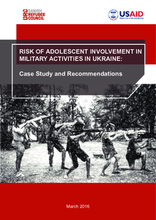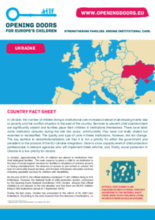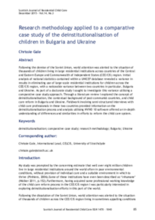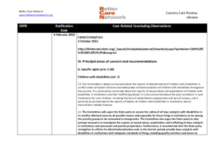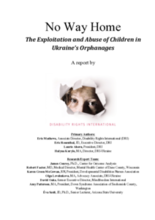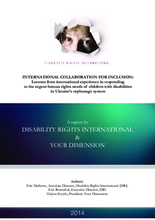This section includes resources, news and other key documents related to children's care in the context of the current humanitarian crisis affecting Ukraine and surrounding countries. This section is updated daily.
News
Featured Resources
Related Tools and Guidance
Country Care Snapshot
Events
Other Resources
Displaying 171 - 180 of 194
Maxim’s story illustrates the problems with institutional care and the stagnation often seen in the child protection system.
In this report, Lazarenko notes that adolescents between ages 16 to 18 who attend vocational educational institutions in conflict-affected areas are at a particularly high risk of involvement in armed forces/groups or sexual exploitation.
To obtain complete data on the child protection system and related problems in Ukraine, Hope and Homes for Children conducted a comprehensive study of the child protection system in Ukraine during the 2015 - 2016 time period. To ensure the integrity of the data, the structure of the study included components focused on different levels of the child protection system in Ukraine (national, regional and rayon), and combined both quantitative and qualitative approaches and methods. The system of institutional care was the main focus of the study.
Due to poverty and military conflicts in the east, the number of children in institutional care in Ukraine has increased.
This study discusses a variance in results in eliminating use of large-scale residential institutions for children across the CEE/CIS region.
This country care review includes the care-related Concluding Observations adopted by the Committee on the Rights of Persons with Disabilities.
This report is a product of a three-year investigation by Disability Rights International (DRI) into the abuses experienced by children - both with and without disabilities - in large-scale institutions, psychiatric facilities, and boarding schools in Ukraine, of whom there are nearly 100,000, according to the report.
This one-page presentation outlines the research questions, data, methods, results, literature review, discussion and implications of a study that looked at the effects of a child’s relationship to head of household, age, and orphan status on the severity of discipline they receive in Ghana, Iraq, Costa Rica, Vietnam,and Ukraine.
This article from the Migration Policy Institute examines the impact of labor migration on children who are left behind, from an economic and social lens, and with particular attention to gendered implications.
This report documents Ukraine’s Soviet-era system of orphanages and other institutions for children with disabilities. The report details the violence, exploitation, and other human rights violations that are frequently committed against these children. It also shows how families who wish to keep their children with disabilities at home are often forced to institutionalize them as a result of lack of support.


